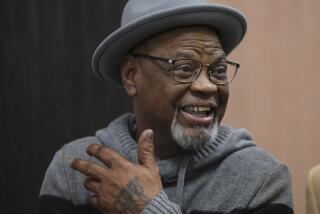Convict Proves Murder Never Happened--23 Years Later
- Share via
LONDON — Patrick Nicholls, a frail British pensioner, walked free Friday after serving 23 years in jail for a murder that never happened in what may be the longest-running miscarriage of justice in British legal history.
“They’ve stolen a third of my life, haven’t they? What else can I say? . . . It’s been a long haul, a long fight,” said Nicholls, 69, quiet and on the verge of tears throughout a news conference here.
He was comforted by Paddy Hill, his friend and supporter who was also imprisoned for 16 years after a wrongful conviction on charges related to an IRA bombing.
“I just feel sad about it all,” Nicholls said.
Nicholls was freed after evidence emerged that the elderly woman whom he had been convicted of murdering had died of natural causes.
Nicholls always insisted that he found Gladys Heath, 74, a family friend, dead at the foot of the stairs in her house in Worthing in southern England.
At the time of his 1975 trial, two pathologists concluded that she had died of a heart attack after being suffocated and severely beaten about the face. Both pathologists are now dead.
Their evidence has been reviewed by John Crane, another pathologist. He concluded that the earlier findings were meaningless and ambiguous.
This view was upheld by Britain’s Crown Prosecution Service.
Nicholls was cleared by three Appeal Court judges Friday.
During his decades in prison, the soft-spoken, bespectacled Nicholls has had a stroke. He has arthritis. His partner is dead. He told commercial Sky television that, when he was released, prison officers turned him out of Albany jail with just a few pounds in his pocket.
“They did take my little sponge ball off of me [part of his therapy after a stroke]. I’ve been told they cost 19 pence [about 30 cents], but it’s prison property. Remarkable, isn’t it?” Nicholls asked with understated bitterness.
He was not offered counseling or help readjusting to freedom, although he said he found life outside prison bewildering.
“Cars seem to have got a lot faster, people are different. I find it difficult crossing roads, whatever,” he said.
James MacKeith, a psychiatrist who works with former prisoners, described the psychological burden faced by those released after wrongful imprisonment: “They often feel that no one can understand what they’ve been through. They feel that they’ve lost years and experiences which can never be recovered. They feel, particularly, a loss of relationships with the family. They often feel a sense of estrangement from the world they return to, having been locked away so long.”
Nicholls would have been released years ago if he had been prepared to show remorse. But his refusal to admit guilt kept him behind bars.
He said Friday that he “wasn’t the only innocent man in prison. We all help each other, give each other strength, because you just have to manage.
“I’ve always thought, in the back of my mind, that eventually justice would be seen to be done,” he added.
Nicholls plans to seek compensation.
His friend Hill--one of six Irish prisoners imprisoned for 16 years after being wrongfully convicted of masterminding an Irish Republican Army bombing in a Birmingham pub in 1974--said Nicholls will not bother with the British legal system but head straight to European courts in his search for justice. The Birmingham Six won about $300,000 each in compensation after they were freed in 1991.
“Great praise must be heaped on Mr. Nicholls that he’s come through what must have been an absolute nightmare,” said his lawyer, Malcolm Hannaford.
More to Read
Sign up for Essential California
The most important California stories and recommendations in your inbox every morning.
You may occasionally receive promotional content from the Los Angeles Times.













